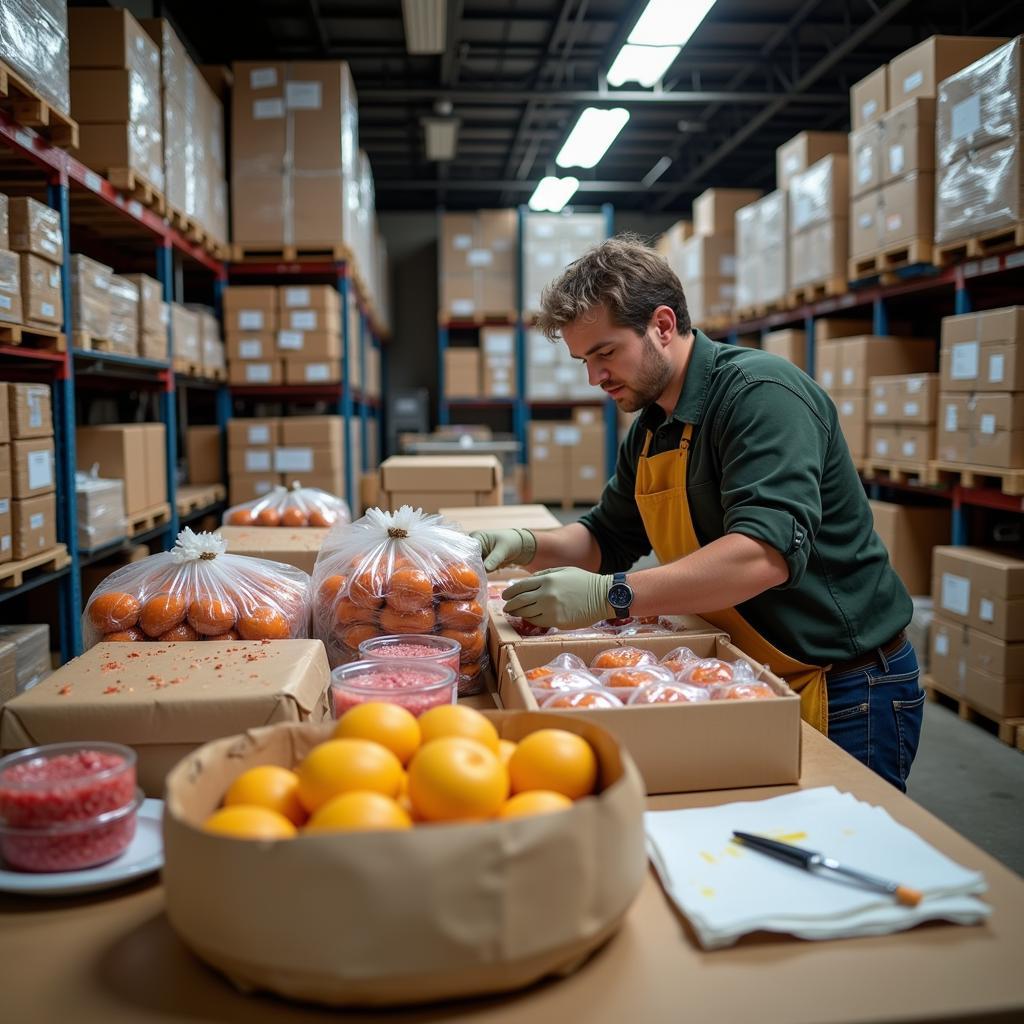Salvage Food Brokers play a crucial role in minimizing food waste and maximizing value within the food supply chain. They connect businesses with surplus or imperfect food products to buyers who can utilize them, preventing perfectly good food from ending up in landfills. This intricate network involves a complex dance of logistics, regulations, and market dynamics, and understanding its nuances can be invaluable for both food producers and potential buyers.
Understanding the Role of Salvage Food Brokers
Salvage food brokers act as intermediaries, bridging the gap between businesses with excess food and those seeking affordable or unique food options. These brokers specialize in sourcing and redistributing a variety of food products that might otherwise be discarded, including surplus inventory, products with minor cosmetic imperfections, items nearing their “best by” date, and even products with damaged packaging.
How Salvage Food Brokers Benefit Businesses
By partnering with a salvage food broker, businesses can recoup some of their investment in unsold or imperfect products, minimizing financial losses. This also reduces the environmental impact associated with food waste disposal, aligning with corporate sustainability initiatives. Moreover, salvage food brokers can provide a reliable and efficient solution for managing surplus inventory, freeing up valuable warehouse space and streamlining logistics.
Finding the Right Salvage Food Broker: Key Considerations
Choosing the right salvage food broker is essential for maximizing the benefits of this partnership. Factors like the broker’s specialization, network of buyers, logistical capabilities, and adherence to food safety regulations are critical.
Specialization and Product Expertise
Some salvage food brokers specialize in specific product categories, such as produce, packaged goods, or frozen foods. Identifying a broker with expertise in your specific product type ensures they understand the market dynamics and can effectively connect you with appropriate buyers.  Salvage Food Broker Inspecting Products
Salvage Food Broker Inspecting Products
Network of Buyers
A robust network of buyers is a crucial asset for a successful salvage food broker. A diverse buyer network ensures a wider range of options for placing surplus products and maximizes the potential for recovering value. This network can include discount retailers, food banks, animal feed producers, and other businesses that utilize salvaged food products.
The Legal Landscape of Salvage Food
Navigating the legal and regulatory framework surrounding salvaged food is crucial for both brokers and businesses. Understanding labeling requirements, liability concerns, and food safety regulations ensures compliance and minimizes potential risks.
Food Safety and Quality Control
Maintaining the safety and quality of salvaged food is paramount. Brokers and businesses must adhere to strict food handling practices and comply with all relevant food safety regulations. This includes proper storage, transportation, and handling to prevent contamination and ensure product integrity.
The Future of Salvage Food Brokering
The growing awareness of food waste and its environmental and economic impact is driving innovation and growth in the salvage food industry. New technologies, such as online marketplaces and data analytics, are streamlining the process and connecting businesses with a wider range of buyers. “The future of food salvage lies in leveraging technology to create a more efficient and transparent marketplace,” says John Smith, CEO of Food Salvage Solutions. “This will not only benefit businesses but also contribute to a more sustainable food system.”
Conclusion
Salvage food brokers offer a valuable service to businesses seeking to minimize food waste and maximize the value of surplus or imperfect products. By understanding the role of these brokers, the key considerations for selecting a partner, and the legal landscape of salvaged food, businesses can effectively leverage this resource to achieve both economic and environmental benefits. Partnering with a salvage food broker offers a sustainable and profitable solution for managing surplus food, contributing to a more circular and responsible food system.
FAQ
- What types of food do salvage food brokers handle?
- How can I find a reputable salvage food broker?
- What are the legal requirements for selling salvaged food?
- How do salvage food brokers ensure food safety?
- What are the benefits of working with a salvage food broker?
- How does the salvage food market work?
- What is the future of the salvage food industry?
Situations:
- A large bakery has day-old bread they want to sell instead of discarding.
- A grocery store has dented cans that are still safe to consume.
- A food manufacturer has excess inventory due to overproduction.
Related Articles:
- Understanding Food Waste Management
- The Benefits of Sustainable Food Practices
Contact us for support at Phone: 02437655121, Email: minacones@gmail.com Or visit us at: 3PGH+8R9, ĐT70A, thôn Trung, Bắc Từ Liêm, Hà Nội, Việt Nam. We have a 24/7 customer service team.